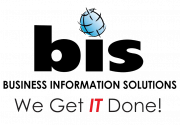Bad security practices are a huge cause of data theft, especially for small and medium-sized businesses. Protecting your company’s data is crucial to your security, productivity, and profits. Improper security also allows potential threats into your network that can cost you time and money. That’s why the methods you use to protect your IT infrastructure are so important. Here are 5 common security practices that could be leaving your business vulnerable – and how to correct them.
Unsecure Wireless Networks
The internet that your business relies on can be installed incredibly quickly with a single internet line, and wireless routers have made it easier than ever for whole businesses to go live in seconds. This type of internet structure is also affordable, which is a plus if you’re a smaller business. But it also comes with a risk – its wireless network may not be secure.
An unsecured wireless network is a field day for hackers and criminals, who can quickly break into your network and siphon off data as well as insert viruses or malware that breaks down your whole system. If this happens, it’s going to cause your business a lot of headaches, time, and money to fix.
To avoid this problem, always be sure to secure your office networks with strong passwords (that means changing them after installation), and be mindful of who you share them with. A strong password is difficult to guess, so don’t use something inherently personal to your business like your address or phone number.
Unsecure Email Systems
Have you upgraded your email system lately? If not, it’s probably time to. Older email systems did not encrypt passwords, creating what is known as “clear passwords”. Unencrypted passwords make it easy for hackers to find and interpret your login information, giving them quick access to your data. If you’re using a Post Office Protocol (POP) system, or an older system that didn’t use encryption, your data is at risk.
More recent email systems use password encryption, especially if they are cloud-based or well-known systems like Exchange. These systems also offer enhanced security and scanning programs, so they’re a much safer option for your business all-around.
Unsecure Mobile Devices
Mobile devices allow businesses to work on-the-go – virtually 24/7. Having your email, contacts, and programs downloaded across devices makes it easy to carry your office with you, but it also opens your system to attacks, malware, and theft. It’s therefore essential that you have strategies and securities in place to keep any mobile device that has access to your network protected.
The simple step of installing passcodes onto your work devices will go a long way in protecting your data. Devices are often misplaced or stolen, and if they don’t have passcodes or screen locks then they can become easy roadmaps into your network. Be sure to outfit all employee devices with strong security measures, including passcodes.
The interconnected system that makes mobile devices so convenient also puts them at risk. Data streams back and forth, meaning that if you download an app or attachment with malware onto a business device it may spread to infect your whole system. Be sure to carefully regulate the use of all employee devices and implement them with adequate security policies. If your employees use their own devices to conduct business, think about implementing a Mobile Device Management System.
Neglected Anti-Malware Software
A business network without anti-malware is like a home full of treasures with an open front door – it’s just not smart. But it is not enough to simply install anti-malware software – you must routinely and properly maintain it to keep your data secure.
Updates can be annoying, but they’re essential to keeping your software running at optimal levels. They’re especially important for security programs like anti-malware because threats to your system are always evolving. Updates will add new databases that can detect and fix new threats as well as ensure that your software is running properly. So don’t press that “update later” key – always keep your software up-to-date.
You should also stagger the times of your security scans. If your software is set to scan during business hours, it’s possible that valuable scans will be skipped by employees who don’t want to pause their work. This will leave your system vulnerable to attack! Try to schedule scans during break times or after hours to be sure that your software can do its job.
Inefficient Firewalls
Imagine a firewall as just that – a flaming wall that prevents unwanted data traffic from entering and leaving your network. A firewall is paramount for businesses that want to prevent hackers, viruses, and worms from infiltrating your network. Firewalls can also allow you to block access to certain websites, giving you control of how your employees are using your network.
Most modern routers and modems come with firewalls, but they are often insufficient to protect a business network. Your best bet is to allow an IT partner to implement a firewall that is specifically designed for businesses into your network. They can give you a robust, whole-network solution that will give you better security to protect your network and data.
What else can I do?
IT security is a constantly evolving process that requires time and attention to be effective; time and attention that you could be using to operate your business. The best way to be sure that your business is properly protected is to work with a professional IT partner who can create and manage whole-system strategies to ensure that your network and systems are secure.
At BIS, we offer a varied and comprehensive range of security and IT solutions to meet the needs of any business. If you’re struggling to keep your business systems protected, or if you’ve discovered that you have bad security practices that need attention, contact us today.
RELATED:
How Security Awareness Training Can Greatly Reduce Security Breaches
Phillip Long – CISSP, CEO of , along with his team of marketing and information technology experts, will walk you through an overview of what your business should be doing to protect your data and plan your digital marketing strategies.
About
is the technology leader on the Gulf Coast and is comprised of four divisions: Information Technology, Web Design & Digital Marketing, Office Equipment and Business Consulting. Together these divisions help local businesses exceed expectations and allow them to group to their full potential while minimizing risks. To learn more about , visit bistechnologygroup.com.
You may reach out to us at:
Phone: 251-405-2527
Email: plong@askbis.com











